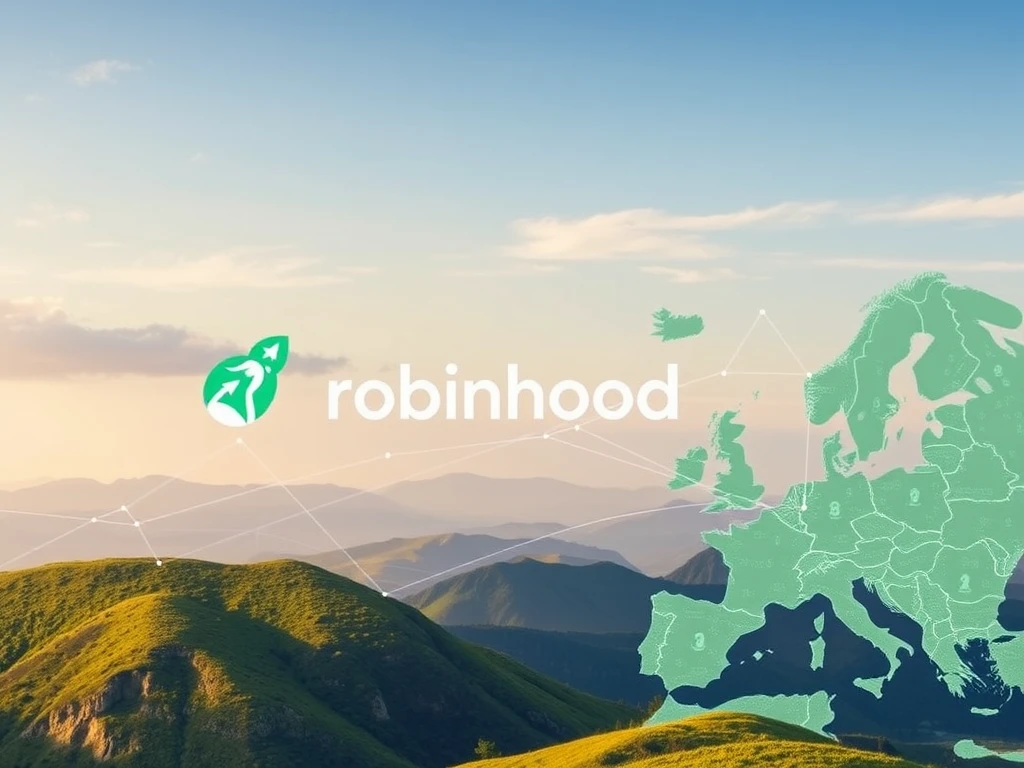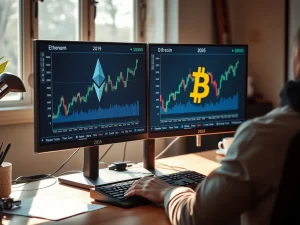Robinhood’s Bold Blockchain Plan Unlocks US Asset Trading in Europe

For cryptocurrency enthusiasts and traditional finance investors alike, the convergence of blockchain technology and established brokerage services is always a hot topic. Reports suggest that **Robinhood** is making a significant move in this direction, planning to launch a **blockchain** network specifically for retail investors in **Europe** to access US assets. This development signals a major step in blurring the lines between traditional finance and the digital asset space.
Robinhood’s Strategic Push into Europe
According to recent reports, brokerage firm Robinhood is developing a blockchain network aimed at facilitating the **trading** of US securities for retail investors across Europe. This initiative is part of Robinhood’s broader strategy to expand its footprint in the European market. The company has already taken concrete steps, including obtaining a brokerage license in Lithuania in April 2025, which allows it to offer investment services throughout the European Union. Furthermore, Robinhood agreed in 2024 to acquire the crypto exchange Bitstamp, indicating a clear interest in integrating crypto and blockchain capabilities into its offerings.
Leveraging Tokenization for Enhanced Access
A core component of Robinhood’s reported plan involves **tokenization**. Tokenization is the process of converting real-world assets, such as stocks or real estate, into digital tokens on a blockchain. Instead of requiring investors to hold the underlying asset directly through traditional means, tokenization allows ownership or exposure to be represented by a digital token. This approach offers several potential advantages:
- **Reduced Costs:** By bypassing traditional financial intermediaries and infrastructure.
- **Enhanced Accessibility:** Making previously illiquid or inaccessible assets available to a wider range of investors.
- **Faster Settlement:** Transactions on a blockchain can settle much quicker than traditional T+2 settlement cycles.
- **Increased Efficiency:** Streamlining processes for issuing, managing, and trading assets.
The exploration of asset **tokenization** is gaining momentum across the financial industry, with more brokerages and investment firms investigating its potential benefits.
Potential Blockchain Partners: Arbitrum and Solana?
Sources familiar with the matter indicate that two prominent crypto firms, Arbitrum and the Solana Foundation, are reportedly competing to partner with Robinhood on this blockchain project. Arbitrum is a leading layer-2 scaling solution for Ethereum, known for its ability to process transactions quickly and cheaply. Solana is a high-performance blockchain platform recognized for its speed and scalability. While reports suggest discussions are ongoing, no agreement has been finalized between Robinhood and either Arbitrum or Solana regarding this specific project. All three parties have reportedly declined to comment on the matter.
What Robinhood’s CEO Thinks About Crypto and Innovation
Robinhood CEO Vladimir Tenev has commented on the rapid innovation seen in the crypto space, contrasting it with traditional financial processes. In a recent interview, he noted the speed at which a digital asset can be created and traded, stating, “You can sit down in front of some software, create a coin and have it be trading in 5 minutes […] That’s a scary thing.” However, he also acknowledged the immense power of this capability when compared to the cumbersome nature of traditional processes like initial public offerings (IPOs). This perspective highlights Robinhood’s awareness of blockchain’s disruptive potential.
Market Reaction and Financial Performance
Following the Bloomberg report on May 7, Robinhood shares saw a positive movement, rising 2.7% on the Nasdaq. While the company’s revenue experienced an 8.6% decline in the first quarter of 2025, it still managed to exceed Wall Street’s expectations. The market’s reaction suggests that investors view strategic initiatives like expanding into Europe and exploring blockchain technology as potentially positive for the company’s future growth.
TradFi Giants Also Exploring Blockchain
Robinhood is not alone in the traditional finance sector exploring blockchain-based solutions. Major financial institutions are increasingly looking at how distributed ledger technology can improve efficiency and create new opportunities. Examples include Banco Santander using blockchain for investor voting back in May 2018 and US giant JP Morgan developing its own blockchain platform called Onyx. These examples underscore the growing trend of established financial players integrating blockchain into their operations.
Conclusion: A Glimpse into the Future of Trading?
Robinhood’s reported plan to launch a blockchain network for US asset **trading** in **Europe** represents a significant potential step towards integrating traditional securities markets with blockchain technology. By leveraging **tokenization**, Robinhood aims to offer a more accessible, efficient, and potentially lower-cost way for European investors to trade US stocks and other assets. While details regarding potential partners like Arbitrum or Solana are still emerging, this move underscores the increasing adoption of **blockchain** solutions within the financial industry and provides an exciting glimpse into the future of global asset **trading**.









